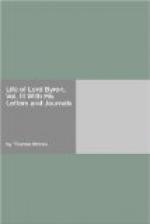OF THE
Life of lord Byron.
“Journal, 1814.
“February 18.
“Better than a month since I last journalised:—most of it out of London and at Notts., but a busy one and a pleasant, at least three weeks of it. On my return, I find all the newspapers in hysterics[1], and town in an uproar, on the avowal and republication of two stanzas on Princess Charlotte’s weeping at Regency’s speech to Lauderdale in 1812. They are daily at it still;—some of the abuse good, all of it hearty. They talk of a motion in our House upon it—be it so.
“Got up—redde the Morning Post, containing the battle of Buonaparte, the destruction of the Custom-house, and a paragraph on me as long as my pedigree, and vituperative, as usual.
“Hobhouse is returned to England. He is my best friend, the most lively, and a man of the most sterling talents extant.
“‘The Corsair’ has been conceived, written, published, &c. since I last took up this journal. They tell me it has great success;—it was written con amore, and much from existence. Murray is satisfied with its progress; and if the public are equally so with the perusal, there’s an end of the matter.
[Footnote 1: Immediately on the appearance of The Corsair, (with those obnoxious verses, “Weep, daughter of a royal line,” appended to it,) a series of attacks, not confined to Lord Byron himself, but aimed also at all those who had lately become his friends, was commenced in the Courier and Morning Post, and carried on through the greater part of the months of February and March. The point selected by these writers, as a ground of censure on the poet, was one which now, perhaps, even themselves would agree to class among his claims to praise,—namely, the atonement which he had endeavoured to make for the youthful violence of his Satire by a measure of justice, amiable even in its overflowings, to every one whom he conceived he had wronged.
Notwithstanding the careless tone in which, here and elsewhere, he speaks of these assaults, it is evident that they annoyed him;—an effect which, in reading them over now, we should be apt to wonder they could produce, did we not recollect the property which Dryden attributes to “small wits,” in common with certain other small animals:—
“We scarce could know they live, but that they bite.”
The following is a specimen of the terms in which these party scribes could then speak of one of the masters of English song:—“They might have slept in oblivion with Lord Carlisle’s Dramas and Lord Byron’s Poems.”—“Some certainly extol Lord Byron’s Poem much, but most of the best judges place his Lordship rather low in the list of our minor poets.”]
“Nine o’clock.
“Been to Hanson’s on business. Saw Rogers, and had a note from Lady Melbourne, who says, it is said I am ‘much out of spirits.’ I wonder if I really am or not? I have certainly enough of ’that perilous stuff which weighs upon the heart,’ and it is better they should believe it to be the result of these attacks than of the real cause; but—ay, ay, always but, to the end of the chapter.




